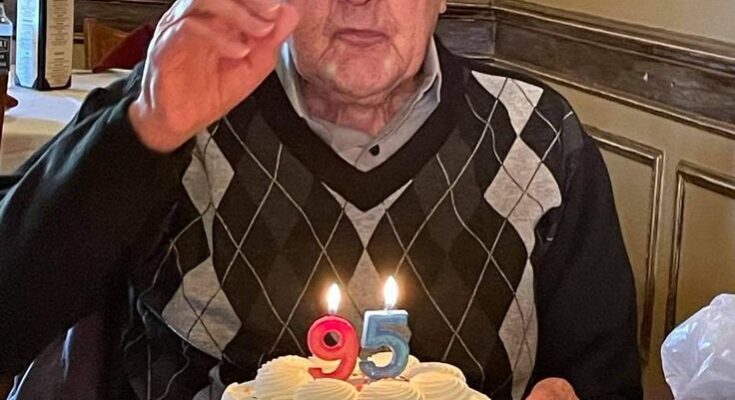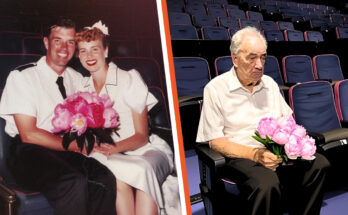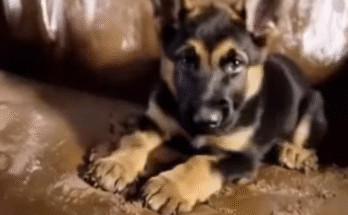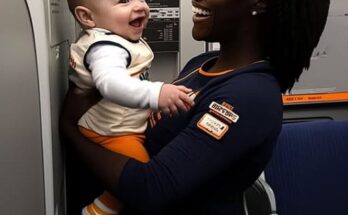We’d all gathered around Granddad’s cake—this giant white-frosted thing with “95” candles practically melting into it. The living room was packed. Cousins, uncles, neighbors who hadn’t shown up in years. Someone had even put on that cringey party hat over his hearing aids, but he didn’t seem to mind.
He looked small in that big armchair, all wrapped in his favorite brown cardigan. But his eyes were sharp. Way sharper than they’d been at his 90th.
We sang the song—off-key and too loud like always—and everyone leaned in, phones out, ready to catch the moment he blew out the candles. That’s when he did it.
Granddad slowly raised his right hand. Not like a wave. Not to cough or scratch his nose. It was slow and steady—like a teacher telling the class to listen.
The room went dead quiet.
Even my little nephew, who’s usually bouncing off the walls, froze mid-bounce.
Then Granddad opened his mouth. His voice wasn’t shaky. It was clear. Calm. He looked right at my mom first, then at me. Then over at Uncle Ben.
“I need to say something,” he said. “Before I blow out these candles… there’s something I should’ve told you all a long time ago.”
He paused. You could hear the ice machine humming from the kitchen.
I felt this weird knot form in my stomach. My mom blinked a few times, then slowly set down her phone. Uncle Ben leaned forward like he already knew what was coming—or maybe hoped he didn’t.
Then Granddad added, “It’s about what happened in 1978. At the lake.”
That’s when my aunt let out a quiet, “Oh no.”
And he smiled, just a little.
Granddad gave one final glance around the room, measuring our reactions. Meanwhile, the candle wax dripped onto the pristine frosting, but no one dared to move. There was something in his voice that told us this was going to matter—maybe more than anything else he’d ever said.
“1978,” he repeated. “I’ve been holding this in for decades. I promised myself I wouldn’t leave this world without telling you all.”
Somewhere behind me, my cousin Danielle gasped. She was just a toddler when Granddad turned 60, so she didn’t know all the stories from that era. But for some of us, “1978 at the lake” stirred a hazy memory. I recalled a half-forgotten story about a summer trip. It had come up in whispers sometimes. My mom used to mention it as “the summer that changed everything.” But whenever I asked, she’d brush me off with some vague explanation about storms and a lost boat paddle.
Granddad cleared his throat, still holding his hand in the air. “First off,” he said, “I want to apologize. I never meant for anyone to get hurt. Not physically, not emotionally… but as you all know, things got complicated.”
He turned his eyes on Uncle Ben, who was gripping his soda can so tightly I thought it might explode. Uncle Ben’s jaw was set, and he glanced down at the floor. Meanwhile, my mom laced her fingers together, like she was bracing herself.
“You see,” Granddad said, “that summer, I was worried about losing the cabin to the bank. We were strapped for money. Your grandmother and I tried to keep it from all of you—didn’t want you to worry. But it weighed on me. I was too proud to ask for help, and I figured that lake cabin was the only real treasure we had left. The day I found out we couldn’t make the next payment, I went out on the boat and… well, I did something I’m not proud of.”
Everyone was listening so intently that even the clock on the mantel seemed to tick louder. I remembered photos I’d seen of that old cabin—its paint peeling, the docks half-rotted. It never looked fancy, but it was ours. It was where we all gathered every Fourth of July, fishing rods in tow, playing board games late into the night. If it was really in danger of being taken away, that would have caused enough stress to push anyone to extremes.
“I took a crowbar,” Granddad continued, “and I pried off a board on the dock. I’d hidden a set of letters there. Letters that proved… well, let’s just say they proved the cabin once belonged to someone else in the family before me.”
He paused, scanning our faces. “That wasn’t actually the scandalous part. The part that haunted me was the accident.”
Mom exhaled so softly I almost didn’t hear it. “Accident?” she asked.
“Yes,” Granddad answered. “I tried to fix the boat after a leak sprung up. I remember it was a rickety old thing, but I loved it. A storm was coming in, and I went out anyway to salvage what I could from the property. I ended up getting stuck out there, lightning flashing above me. But that’s when I saw young Benjamin—your uncle—waiting on the dock, waving at me to come back.”
Uncle Ben nodded, eyes flickering with old memories. He said quietly, “You told me to stay put because the storm was dangerous. But I didn’t listen.”
Granddad gave a wan smile. “You were only seventeen. And, Lord, you were stubborn. I saw the waves swelling. The wind picked up, and I yelled for you to run back to the cabin, but you jumped in anyway. Tried to help me tie the boat up. That’s when you slipped on the wet dock. Your head hit the side so hard you passed out. For a moment, I thought you were gone.”
I heard my mom stifle a sob. A few family members gasped. Suddenly, it felt like we were all there on that dock in the middle of a thunderstorm, hearts pounding.
“I dragged you onto the boat,” Granddad said, “somehow got you into that rickety thing, and started paddling like a madman toward shore. We lost the crowbar, lost the letters, and all I remember was the sound of thunder cracking over our heads, the taste of rain on my lips, and praying I’d make it back.”
Uncle Ben lifted his hand to the faint scar by his temple that I never really asked about. “I barely remember anything, except waking up by the fireplace. I was wrapped in towels, and you were pacing the room. You didn’t say a word about those letters. Not then, not ever.”
Granddad sighed. “Because after that scare, I realized that losing the cabin would be nothing compared to losing one of you. But I never told you the full story because I felt guilty. I’d taken a reckless risk that almost cost me my grandson.”
He paused and looked around at all of us. “It’s time you all knew. I kept those letters hidden afterward, and I made an arrangement with the bank. A few months later, I sold off something else—my old plot of farmland—to keep the cabin safe for the family. None of you ever questioned it too deeply. I guess you were all too relieved Uncle Ben was okay.”
A hush settled in. I noticed my aunt wiping her eyes with the corner of a napkin. The kids, who’d been too small to understand all this, were wide-eyed, absorbing the gravity of it. I think part of me was shocked that it wasn’t some bigger secret—like a crime or hidden identity. But the truth was heavier in a different way: family love and worry, regrets and near tragedies that none of us had fully understood.
Granddad lowered his hand and gazed at us with a relieved look, like he’d finally put down a weight he’d been carrying for years. “I just couldn’t keep it inside anymore. This family means everything to me. And I want you to know, when we stick together, we can get through anything. Even storms.”
A moment passed, and then a few people moved closer to him, including Uncle Ben. Without a word, Uncle Ben knelt next to Granddad’s armchair. He touched Granddad’s hand gently, tears brimming in his eyes. “I—I’m sorry if I ever made you feel like you couldn’t tell us the truth. Maybe I was too angry back then, blaming you for dragging me into that storm.”
Granddad placed his free hand over Uncle Ben’s. “It’s alright. I was afraid. Afraid you’d resent me. Afraid everyone would see me as a failure who couldn’t protect his family. But secrets fester. I wish I’d told you sooner.”
Mom, still standing near the cake, offered a trembling smile. “I… I don’t know what to say, Dad. I’m just glad you finally got it off your chest.”
One of the neighbors, Miss Francine—who’d lived next door to the cabin all those years ago—spoke up quietly. “I remember that storm. My roof nearly blew off. Never knew all of this happened. Thank you for sharing.”
Danielle, who was probably overwhelmed by this raw family history, reached out to me and whispered, “I always wondered what people meant when they talked about ‘that summer.’ Now it makes sense.”
I nodded. “It does,” I said, voice tight with emotion.
We stood there, candles flickering on the cake, until Granddad finally gave a small chuckle. “Well, that’s my confession. And if you’ll all forgive me, I’d like to blow out these candles before the frosting turns into candle soup.”
A burst of relieved laughter rippled around the room, fragile but genuine. The tension broke. Phones came back up to record the moment, but this time there was a deeper sense of togetherness. Granddad took a breath, glanced at Uncle Ben, then glanced at everyone else, and with one mighty (well, semi-mighty) blow, he put out all 95 candles—plus the big “9” and “5” shaped ones that were standing on either side.
Applause erupted. The moment was surreal. We were cheering, hugging, some of us crying. A few of the older uncles were patting each other on the back. It felt like the room had shifted, like we’d just watched a dam break and the water was finally flowing free. The secret was out. The relief, the closure, washed over us all.
As we cut into the cake, neighbors shared old memories of the cabin, how they’d also gone through tough times. My aunt June rummaged through her purse and pulled out a vintage Polaroid she’d found recently—it was of Granddad, Uncle Ben, and my mom sitting on the front porch of that very cabin, grinning widely in the summer sun. On the back, the date: August 1978. You could see the old boat in the background, tied up at the dock, before the storm had come.
Granddad smiled at that photo for a long time. It was clear that he was relieved, maybe even lighter. After nearly half a century of carrying that story, he’d finally let it go in front of all of us. I couldn’t help but feel that we were all closer now—that secrets, once out in the open, can heal wounds instead of deepen them.
Later, we served slices of cake on paper plates. People lingered longer than usual, talking about the lake days—both the happy moments and the hard ones. Uncle Ben found the courage to apologize for some long-standing grudges he’d held, and Granddad just squeezed his shoulder with that same loving, stern look he always had when teaching us a lesson.
Eventually, my mom wrapped Granddad in a hug, whispering something in his ear. He nodded, and I saw tears in both their eyes. Then she asked him, “Do you regret selling that farmland?”
Granddad chuckled softly. “Nah. A piece of land is just a piece of land. Having all of you in my life—that’s what matters. Always has, always will.”
I noticed that every conversation was softer, every hug tighter. Even my cousin Reggie, who rarely shows up to family functions, seemed genuinely touched. He told Granddad he was proud to be part of this family, storms and secrets included.
In the end, when most of the guests had gone, I sat next to Granddad as he sipped his favorite tea in that big armchair. He still wore that silly party hat, which had somehow survived the evening, even if it looked like it might fall off at any second.
He looked over at me with a gentle smile. “Thanks for sticking around,” he said. “I know it was a lot to unload on everyone.”
I shrugged, trying to lighten the mood. “You only turn 95 once, right? Might as well make it memorable.”
He laughed, and for a moment, I could see the younger version of him—probably the one who rowed across the lake in that storm. Then he said, “Family is complicated. But when we share the hard truths, we connect on a deeper level. Keeping secrets builds walls, but honesty… honesty brings us closer. Remember that, kiddo.”
I nodded. “I will, Granddad.”
The next day, after everyone had gone, I found a small scrap of paper on the kitchen table. It was an old note from Granddad, from years ago, with just one line: “Love anchors us more than fear ever could.” I smiled, realizing that was probably the best possible summary of what he’d been trying to say to us all night.
His confession wasn’t about big drama or hidden wealth. It was about family bonds, about admitting mistakes, about understanding that love sometimes involves risk—and that when you almost lose something precious, you learn to cherish it even more.
That night, I couldn’t shake the warmth I felt. Because the truth is, at 95 years old, Granddad gave us all a gift more valuable than any cabin or farmland. He reminded us that no matter how old we are, it’s never too late to be honest with the people we love. And in that honesty, we find our real strength as a family.
Cherish your loved ones enough to be open and honest—even if the truth is messy or difficult. When we share our burdens, we lighten them together. It’s in those vulnerable moments that genuine forgiveness and understanding take root.
If you felt moved by this story, please share it with friends and loved ones. Don’t forget to “like” this post so that more people can read and perhaps find the courage to share their own secrets, heal old wounds, and keep their families close. After all, our shared stories bring us closer than we ever imagined.



